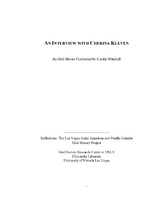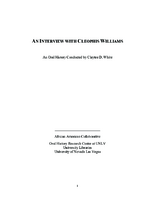Search the Special Collections and Archives Portal
Search Results

Rodel Fuentes oral history interview: transcript
Date
Archival Collection
Description
Oral history interview with Rodel Fuentes conducted by Tracy Fuentes on December 4, 2021 for Reflections: The Las Vegas Asian American and Pacific Islander Oral History Project. Rodel Fuentes tells stories of his upbringing in Manila, Philippines, where he was raised in a shared family home amongst his parents, siblings, aunts, and uncles. He talks about his parents' immigration to the United States and how he later joined them in Los Angeles, California where he met and married his wife. Rodel Fuentes shares the couple's decision to move to Las Vegas, Nevada, his work at Dunn Edwards paint company, and how he became a licensed general contractor and real estate agent where he now owns his own company. Rodel Fuentes discusses his thoughts on Las Vegas' diversity, affordability, restaurants, and Asian community. He also talks about experiencing anti-Asian hate, worsened by misconceptions and discrimination that came from the COVID-19 pandemic.
Text

Jill Roberts oral history interview: transcript
Date
Archival Collection
Description
Oral history interview with Jill Roberts conducted by Barbara Tabach and Claytee D. White on March 20, 2018 for the Remembering 1 October Oral History Project. In this interview, Jill Roberts discusses her position as the CEO of the Trauma Intervention Program (TIP) of Southern Nevada. She also delves into her part-time work at the coroner's office as a death investigator and discusses her personal background in Las Vegas, Nevada after she moved to the city in 1977. She describes the role TIP had during the aftermath of the October 1, 2017 mass shooting, where well-trained volunteers were dispatched to hotels, hospitals, and anywhere else the survivors reached in order to provide emotional and practical support. Throughout the interview, Roberts emphasizes that the assistance provided to those in a traumatic event depends on each individual's needs. She shares a few examples of what the TIP volunteers had helped with after the shooting, including listening to the survivors' stories as well as providing information on the situation, helping separated loved ones find each other, arranging travel for some survivors to go back to their homes, and procuring clothes and shoes for those who needed them. Roberts also discusses the gratitude TIP had received after the shooting, including the thank you cards sent by Sandy Hook High School.
Text

Christina Gruber oral history interview: transcript
Date
Archival Collection
Description
Oral history interview with Christina Gruber conducted by Barbara Tabach on March 2, 2019 for the Remembering 1 October Oral History Project. In this interview, Gruber shares her experience living in Las Vegas, Nevada since 1997 and as a Certified Public Accountant (CPA), mother of two, and physical fitness enthusiast. She recalls being shot during the Route 91 Harvest Festival and being rescued by strangers. She recalls the chaos of the evening, but also how strangers worked together to comfort each other amidst the terror. She discusses dedicated her athletic races to those who were murdered that evening, and how it has helped her recovery.
Text

Cherina Kleven oral history interview: transcript
Date
Archival Collection
Description
Oral history interview with Cherina Kleven conducted by Cecilia Winchell on June 9, 2021 for Reflections: The Las Vegas Asian American and Pacific Islander Oral History Project. Cherina Kleven talks about her family and childhood growing up in Taiwan amongst six siblings. She shares her family's history and how they immigrated to Las Vegas while she was a teen, as well as her employment history and how she met her husband. Cherina talks about racial and gender discrimination and the obstacles she has overcome to be the only working female in her family, the only woman firefighter at her station house, and the first female Asian American Assistant Fire Chief in the United States.
Text

Transcript of interview with Elaine Cali McNamara by Claytee White and Stefani Evans, October 5, 2016
Date
Archival Collection
Description
This ability to greet each day with a challenge has laid the foundation for a long history of success for Elaine McNamara as she has navigated through local beauty pageants, an illustrious real estate career, serving on the Las Vegas-Clark County Library board during their decade of expansion to authorship. Her story of resilience starts when she became ill at approximately seven or eight with erythema nodosum that impeded her ability to walk for five months when she started collecting pictures of movie stars. Her favorite movies were any of Roy Rogers, Abbott and Costello, Dean Martin and Jerry Lewis. Her family moved to Las Vegas, where she attended Las Vegas High School as well as UNLV majoring in elementary education and minoring in language arts. While she attended high school, she studied modeling in the evenings to help overcome her shyness and to become more outgoing. Becoming more involved with local and state beauty pageants, she met the likes of Phyllis Diller, Natalie Wood,
Text

Mike Meade interview, February 28, 1977: transcript
Date
Archival Collection
Description
On February 28, 1977, collector Steve Gortz interviewed Mike Meade (b. September 16, 1950 in San Francisco, California) about his life in Nevada. Meade speaks about growing up in Tonopah, Nevada before its decline in population, his move to Elko, Nevada and eventually to the city of Las Vegas. Moreover, he talks about the development of the Strip, the differences between Las Vegas and rural Nevada, as well as the changing environmental landscape. Meade also spends time discussing the controversy surrounding the University of Nevada, Las Vegas (UNLV) dormitory at the time of this interview, the attitude of locals, and his opinion on brothels and prostitution. Lastly, Meade talks about the city’s pollution, the sports and recreation throughout the whole of the state and ends by reading a poem about Nevada from a Bicentennial book.
Text

Transcript of interview with Cleophis Williams by Claytee White, April 27, 2010
Date
Archival Collection
Description
In 1943, Cleophis Hill Williams was a teenager visiting her mother who had moved to Las Vegas. For most of her young life she had lived with her parents in Muskogee, Oklahoma and Paul Spur/Douglas, Arizona. The same year that she visited Las Vegas, she met her future husband Tom Williams, with whom she had nine children, all born and raised on the Westside. Tom worked construction and built their first home on G Street. For Cleophis, she focused her life on raising her children and, whenever possible, finding some precious time to read.
Text

Mario Sandoval interview, December 6, 2018: transcript
Date
Archival Collection
Description
Interviewed by Claytee White. Mario and his six siblings were reared by a single mother who taught him all of the family recipes. Moving to Las Vegas at four years of age Mario remembers moving into a black neighborhood where the family was not welcomed. All windows in their home were broken into the first night. The family moved the next day. Though the new house was still in an African American neighborhood, they were protected by Vera, their black babysitter. Mario developed the intense work ethic of his mother, and after working in several strip casinos, found his home at the Horseshoe, today's Binion's. He has been there for 33 years; first as a busboy and then becoming a waiter. He is a Culinary Union trained shop student who picketed his beloved work place for ten months during a 1980's labor dispute. His work in life and union benefits have made his a very good life.
Text

Transcript of interview with Harold R. Hunter by Philip John Mile, March 19, 1978
Date
Archival Collection
Description
On March 19, 1978, Philip John Mile interviewed former chef, Harold R. Hunter (born 1901 in Norwich, Kansas) about his life in Southern Nevada. Hunter discusses his different experiences working in early Las Vegas restaurants during the thirties and forties. Hunter also discusses the rapid growth of the Mormon community during this time.
Text

Transcript of interview with Willie Jones, James Jones, and Jamet Jones by Robbin Mc Laurin, March 5, 1980
Date
Archival Collection
Description
On March 5, 1980, collector Robbin McLaurin interviews three members of the Jones family, Willie, James, and Jamet Jones (born 1923, 1920, and 1961, respectively) in the Jones home. Mr. and Mrs. Jones were born in Forest, Mississippi, and relocated to Las Vegas, Nevada, for employment related purposes. This interview covers Las Vegas, past and present.
Text
